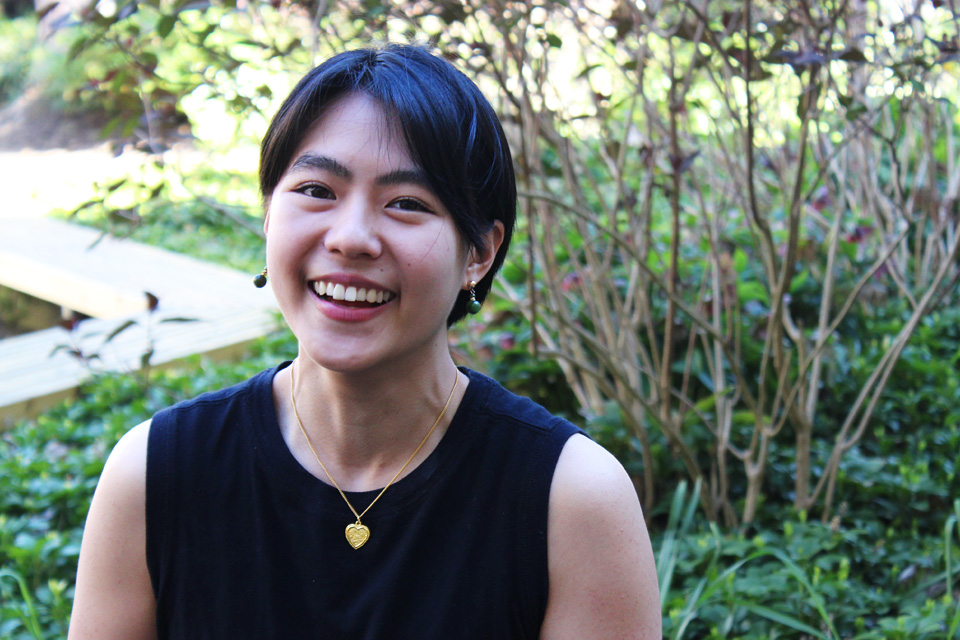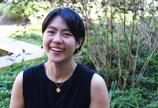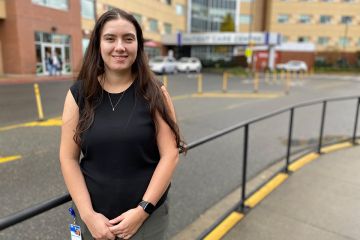The language of community
- Katy DeCoste

As a student in Mandarin classes at UVic, Mina Guan approached the material as someone who grew up with Mandarin and Cantonese in the home—what’s known as a heritage language learner. In class, she found a community of other heritage language learners, and she started to wonder: how can heritage language learners use their own backgrounds in the learning process?
Language, heritage and identity
This question was the root of her eventual Honours project in Applied Linguistics. Interviewing teachers and heritage language learners, Guan found that heritage language learners bring diverse needs and unique assets to the classroom through their existing language knowledge and lived experiences.
“When teaching heritage learners, it’s important to recognize learner assets and disrupt the idea that teachers possess all knowledge,” Guan recommends.
In my research, it was interesting that teachers could also embody the role of a learner when interacting with heritage language learners. I think that opening the classroom for learners to share their experiences can be fruitful for everyone involved in the teaching and learning process. I’ll definitely take this concept with me after I graduate—we all have so much to learn from each other, whether you are a community member or a teacher or an academic.
—Mina Guan
When Guan started as a student in general linguistics, she was fascinated by the discipline. Immersed in the theoretical nature of the discipline, her first applied linguistics class thrilled her by introducing her to linguistics’ practical uses in the community.
The Applied Linguistics program’s practicum component sealed the deal for Guan. “It was more based in the community, and I felt like I could give back my knowledge to someplace,” she explains. Building on her experience taking French courses at UVic through the U Start program as a high school student, Guan completed a minor in French and Francophone Studies and a Certificate in Language and Cultural Proficiency in Chinese.
Now, Guan’s passion lies in sociolinguistics, especially in heritage language maintenance. A heritage language is a minority language learned by its speakers at a young age, typically in the home. For Guan, a heritage speaker of Mandarin and Cantonese, studying the experiences of heritage language learners in post-secondary classrooms reflected her own experiences studying Mandarin and Chinese culture at university.
Language is so closely tied to identity. I grew up speaking multiple languages, and not respecting my languages at one point in my life. Applied linguistics really helped me find that part of myself again.
—Mina Guan
Cultivating connection
Guan wasn’t always sure how a linguistics degree might translate into community work, though. She credits her experience with UVic’s co-op program for making the connection between her academic work and her career interests. In a work term for the Legacy Art Gallery, she found a passion for free and accessible knowledge mobilization. Her most recent co-op term was a research placement with Dr. Li-Shih Huang on a project investigating perspectives on equity in the International English Language Testing System (IELTS) testing. The blend of community work and research helped braid together the strands of Guan’s degree.
On top of her language studies, co-op experiences and research, Guan has been involved with the Underlings, the course union for linguistics undergraduates, since her second year, initially volunteering to help with social media before serving as social media coordinator, co-chair, and now, chair of the course union.
I get a lot of joy creating events where linguistics undergraduate students can come together.
—Mina Guan
She’s most proud of a virtual speaker series, prompted by fellow executive team member James Kuan, that featured linguists who have created famous fictional languages. The series included talks by Dr. Paul Frommer, the creator of Na’vi, and Dr. Jessica Coon, the inventor of the heptapod language in Arrival.
Underlings helped me form a lot of really meaningful friendships. I have a lot of memories of working late on campus with the friends I made, just sharing experiences and common goals and working stuff out.
—Mina Guan
Reflecting on her degree, Guan says she’s come to embrace the process of learning, of chasing down paths of curiosity and exploration. After all, those are the paths that brought her to the places she loved the most.
Enjoy reading UVic publications? Share your thoughts and shape the future of UVic publications by taking our survey.
Photos
In this story
Keywords: convocation, student life
People: Mina Guan
Publication: The Ring





